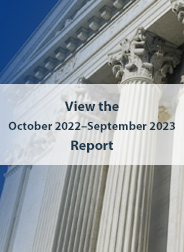Overview
These publications summarize the International Terrorism Victim Expense Reimbursement Program (ITVERP) annual activities and statistics, starting with the September 2008–August 2009 reporting period. They cover two critical areas of ITVERP assistance: application processing and claims payment, and public awareness activities intended to reach out to potential claimants. Each report concludes with a discussion of future program needs and suggested improvements.
Read the Annual Reports
October 2022–September 2023 Report
- October 2021–September 2022 Report
- October 2020–September 2021 Report
- October 2019–September 2020 Report
- October 2018–September 2019 Report
- October 2017–September 2018 Report
- October 2016–September 2017 Report
- October 2015–September 2016 Report
- October 2014–September 2015 Report
- October 2013–September 2014 Report
- October 2012–September 2013 Report
- September 2011–September 2012 Report
- September 2010–August 2011 Report
- September 2009–August 2010 Report
- September 2008–August 2009 Report
- September 2007 – August 2008 Report
- October 2006 – August 2007 Report
About These Reports
The establishment of ITVERP in 2006 enabled the Office for Victims of Crime (OVC) to take an important step forward in responding to the needs of victims of international terrorism. The creation of ITVERP broke new ground in the field of victim services and filled a critical gap in outreach for this population of crime victims.
As mandated by Congress, OVC must submit annual reports on ITVERP activities that include the following:
- An explanation of the procedures for filing and processing applications for reimbursement.
- A statistical analysis of the assistance provided under the program, including:
- the number of applications for reimbursement submitted,
- the number of applications approved and the amount of each award,
- the number of applications denied and the reasons for denial,
- the average length of time needed to process an application,
- the number of applications in process, and
- the estimated future liability of the program.
- A description of the procedures and policies instituted to promote public awareness of the program.
- An analysis of future program needs and suggested program improvements.
Each annual report showcases OVC’s efforts to implement ITVERP and enhance benefits and services to victims of international terrorism during a 12-month period.
Legislation and Funding
In 2000, Congress amended the Victims of Crime Act (VOCA) of 1984 [34 U.S.C. § 20106] (Public Law 98–473), to include authorization for OVC to establish a federal program that would uniformly and equitably provide assistance to victims of designated terrorist acts for certain expenses, regardless of the victim’s legal state of residence. This program became ITVERP.
ITVERP became operational on October 6, 2006, when final regulations (28 C.F.R. part 94) governing the program went into effect. Learn about who is eligible to receive ITVERP reimbursement.
ITVERP is funded through the Antiterrorism Emergency Reserve (the Emergency Reserve), a component of the Crime Victims Fund (the Fund) [1].
The Fund is financed by fines and penalties paid by persons convicted in federal cases, as well as gifts, donations, and private bequests. It does not use tax dollars. The OVC Director may authorize the use of funds from the Emergency Reserve for the following purposes:
- to fund ITVERP,
- to support compensation and assistance services for victims of domestic terrorism or mass violence,
- to support assistance services to victims of international terrorism, and
- to transfer funds to U.S. district courts to cover the costs of special masters appointed to hear damage claims in certain cases brought under the terrorism exception to foreign sovereign immunity.
Through ITVERP, OVC provides reimbursement to victims of international terrorism and their families for expenses related to medical care, funeral and burial expenses, repatriation of remains, mental health counseling, property loss, and miscellaneous expenses, such as emergency travel.
[note 1] Congress established the Fund in 1984 and, in 1996, allowed $20 million of the Fund to be set aside for the Emergency Reserve. In 2001, the set-aside was increased to $50 million. The Uniting and Strengthening America by Providing Appropriate Tools Required to Intercept and Obstruct Terrorism Act (USA PATRIOT Act) of 2001 authorizes the OVC Director to replenish the Emergency Reserve in subsequent fiscal years by using up to 5 percent of the amount remaining in the Crime Victims Fund in any fiscal year after distributing amounts otherwise available for that year.


